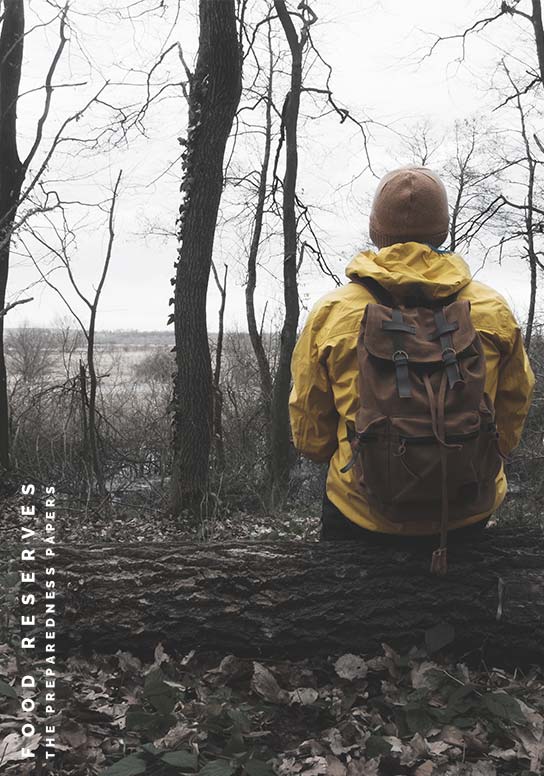THE PREPAREDNESS PAPERS
The information in the "Preparedness Papers" is FREE. Each "paper" has a PRINT button, so you can print and reference them "offline" as needed.


The Hug-A Tree & Survive program was started in San Diego, California after a nine year old boy became lost and died on a nearby mountain. The hope was to avoid a similar tragedy. If children do get lost, this program will teach the child how to stay comfortable. Most importantly, the program teaches the lost youngster how to be spotted and found.
We hope your children will never need this knowledge, but vacations often take families to remote areas where it is easy to get lost. We do not realize that getting lost can happen anywhere. I know; I live within the city limits of a small town on a cul-de-sac where everyone has several acres and horses. One morning there was a disturbance in the normally quite neighborhood. A young girl had become lost some distance away and had wandered within 50 yards of my neighbor's home, only to die at the gate to the yard. Many lessons can be learned from the mistakes of others. Learn the facts that follow and discuss them with your child. If a search becomes necessary, it can be short and successful.
SURVIVAL FACTS FOR CHILDREN
These are things to teach your children. Make them into a game for better retention:
1) Always carry a trash bag and whistle on a picnic, hike or camping trip. By making a hole in the bag for the face (without this hole, there is a danger of suffocation) and putting it over the head, it will keep the child dry and warm. The whistle will be heard from a greater distance than the child's voice and takes less energy to use.
2) Hug-A-Tree once you know you are lost. One of the greatest fears a person of any age can have is of being alone. Hugging a tree and even talking to it calms the child down and prevents panic. By staying in one place, the child is found far more quickly and can't be injured in a fall.
3) My parent's won't be angry with me. Time and again, children have avoided searchers because they were ashamed of getting lost; children as well as adults. If they know a happy reunion filled with love is waiting, they will be less prone to panic and will work hard to be found.
4) Make yourself big. From helicopters, people are hard to see when they are standing up, or in a group of trees, or wearing dark and drab clothing. Find your tree to hug near a small clearing if possible. Wear a red or orange jacket when you go near the woods or desert. Lie down when the helicopter flies over. If it is cool and you are rested, make a cross or "SOS" with broken shrubbery, rooks, or by dragging your foot in the dirt.
5) You have 200 friends looking for you. We have had children in the area of a search tell us, "My parents would never spend the money to search for me with all these people." Of course, search personnel are professionals and volunteers who charge nothing and do it because they care. Many children who are lost don't realize that if they sit down and stay put, one of a few hundred people will find them. Some are afraid of strangers or men in uniform and don't respond to yells. Some have actually hidden from searchers they knew who were looking for them.
6) Animals in this area won't hurt you. If you hear a noise at night, yell at it. If it is an animal, it will run away. If it is a searcher, you will be found. Fears of the dark and wild animals often cause children to run away. They need strong reassurance to stay put and be safe.
7) Foot printing your child is a five-minute exercise that cuts down the time of a search by several hours. Have the child step on a piece of aluminum foil that has been placed on a soft surface such as carpeting, a folded towel or sand. Mark the foil with the child's name. With this print, trackers (who work with the border patrol) can separate your child's tracks from the hundreds of others in the area, and quickly determine the direction of travel.
Ken Larson is the author of this article. He is a disaster analyst and survival expert, who has worked with victims of numerous natural disasters. He is author of "God's Free Harvest — How to Prepare and Prosper during Uncertain Times ahead." The 233-page book details 40 wild edibles that can save your life; 53 photos and 41 illustrations. Available from Rhema Publishing, PO Box 789-E, Suwannee, GA 30174 ($12.95 + $2.00 postage and handling) (404) 932-6991
ADDITIONAL INFORMATION
Hug-A-Tree & Survive is a non-profit organization supported solely by donations.
For information or to send contributions please send a self-addressed, stamped, legal size envelope to: Jacquie Beveridge, National Office Hug-A-Tree, 6465 Lance Way, San Diego, CA 92120; (619) 286-7536, 9 a.m. to 5 p.m. Pacific Time
For a free copy of FEMA pamphlet "Tour Family Disaster Plan" and/or "Survival Testing for Wild Foods" write Rhema Publishing, PO Box 789-E, Suwannee, GA 30174. Ask for either or both.
By accepting you will be accessing a service provided by a third-party external to https://foodreserves.com/